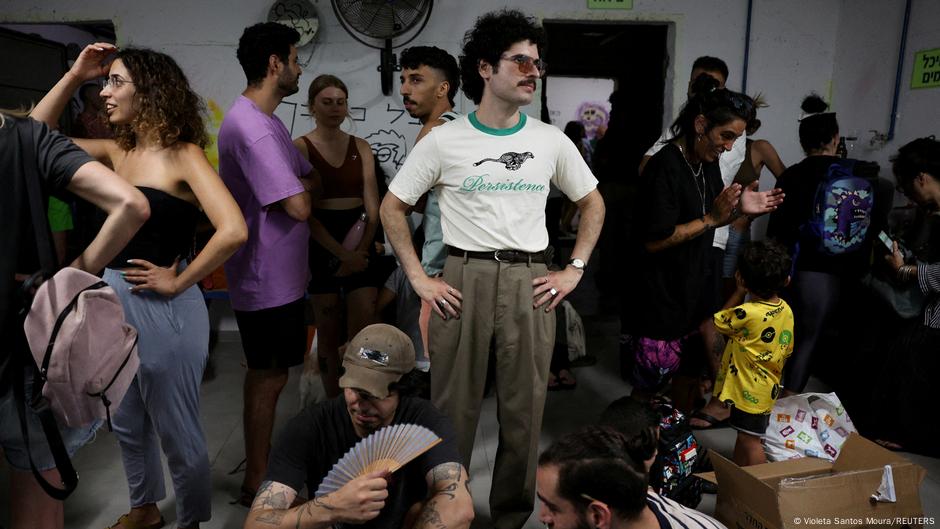As missile attacks from Iran continue, many in Israel are contemplative about how this conflict will affect the war in Gaza and the fate of hostages still held by Hamas. In a narrow corridor of one of Tel Aviv’s underground bomb shelters, the absence of an internet connection has left residents anxiously isolated from real-time information about the explosions echoing outside.
Lior, a young Israeli who chose not to disclose his surname, expressed the worry that comes with these attacks. “We can make the distinction by now what is an interception or a hit, but obviously you worry about how close it is or if someone you know might be in danger,” he said while attempting to find mobile service.
Since Israel’s assault on Iran a week prior, the city’s atmosphere has been dictated by alerts from the Home Front Command and the shrill wails of air raid sirens warning of incoming missiles. On Thursday morning, Iran launched another wave of missile strikes. While most were intercepted, some caused significant damage to structures in Holon and the suburb of Ramat Gan, as well as Soroka Hospital in Be’er Sheva, which had been evacuated just the day before.
“Life must go on, and we’ve been through many other crises, but this is certainly a very strange and unsettling time,” Lior remarked.
Recalling a recent early morning alert when one missile slipped past defenses and struck a nearby building, Shira, another young Israeli who also declined to share her last name, shared her fears. “It’s scary. We understand that the missiles are deadlier and that the situation feels different from previous conflicts. I wonder how long this can go on for. People are already on edge from not sleeping most nights.”
Prime Minister Benjamin Netanyahu has long viewed Iran as Israel’s primary security threat. Iran claims its nuclear ambitions serve civilian needs, but Netanyahu argues they serve military agendas. Iranian leaders have repeatedly vowed to eliminate Israel, posing additional threats through their ballistic missiles and regional proxies.
Despite threatening military action against Iran for years, Netanyahu has largely avoided direct confrontation, engaging instead in a covert campaign characterized as a “shadow war” involving cyberattacks and threats against Iranian allies like Hezbollah and Hamas.
Analysts note that a pivotal change occurred on October 7 when Hamas militants launched a devastating assault, resulting in approximately 1,200 Israeli casualties, primarily civilians, and 251 hostages taken.
This security breach has increased pressure on Netanyahu, who, despite his previous portrayal as the protector of Israeli safety, faces criticism for not preventing this attack and for the subsequent escalation in Gaza, which reportedly has claimed the lives of around 55,000 Palestinians.
Domestically, Netanyahu’s critics accuse him of prolonging the war in Gaza and failing to secure a hostage release agreement. His far-right coalition partners threaten a political crisis should he seek to halt the conflict without dismantling Hamas. Amidst all this, some Israelis view Netanyahu’s recent military operations against Iran positively, with a Tel Aviv University poll indicating that 83% of Jewish Israelis support the strikes and trust the military’s readiness for a prolonged conflict.
Conversely, many Palestinian Israelis oppose the strikes, advocating for diplomacy over aggression. In the aftermath of a missile striking his neighborhood in Ramat Gan, Ronny Arnon remarked, “I am in the minority here, so many people are supportive. Our prime minister is called the magician because he knows how to make a show, how we are winning and beating all our enemies. We started a fire we don’t know how to end.”
Analysts speculate that Israel’s recent attacks were facilitated by its earlier successes in countering Iranian proxies in the region. Following significant reductions to Iran’s defenses, Israel was poised for a more aggressive military stance.
U.S. President Donald Trump’s role in this situation remains pivotal, as he contemplates potential military involvement alongside Israel against Iran. Although Trump previously advised against military engagement, his stance has shifted, demanding Iran’s “unconditional surrender” while postponing any plans for direct action against its leaders.
Meanwhile, the situation continues to deepen in Gaza, where protests have emerged, with demonstrators, including the mother of a soldier taken hostage, expressing their fears of being forgotten as global attention wavers.
Anat Angrest, the mother of hostage Matan Angrest, voiced her concerns, stating, “When the war in Iran began, we were really afraid my son will be forgotten there in Gaza, his situation is bad, his life is in danger. But… I got a lot of messages from many Israelis that they felt that with the success in Iran, this will help to bring [the hostages] back.”
Angrest remains critical of the Netanyahu government’s efforts in securing the release of hostages but holds hope that a weakened Iran might diminish Hamas’s support, potentially allowing for an end to the conflict in Gaza. “We hope that the decision to act now is connected to Gaza; that it is part of a strategic plan… and we won’t be in danger anymore,” she added.

